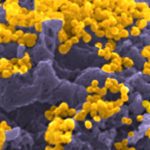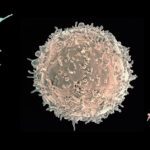Potent human broadly neutralizing antibodies to hepatitis B virus from natural controllers
Verena Hehle, Maxime Beretta, Maryline Bourgine, Malika Ait-Goughoulte, Cyril Planchais, Solen Morisse, Benjamin Vesin, Valérie Lorin, Thierry Hieu, Andrea Stauffer, Oriane Fiquet, Jordan D. Dimitrov, Marie-Louise Michel, Marie-Noëlle Ungeheuer, Camille Sureau, Stanislas Pol, James P. Di Santo, Hélène Strick-Marchand, Nadège Pelletier and Hugo Mouquet
Rare individuals can naturally clear chronic hepatitis B virus (HBV) infection and acquire protection from reinfection as conferred by vaccination. To examine the protective humoral response against HBV, we cloned and characterized human antibodies specific to the viral surface glycoproteins (HBsAg) from memory B cells of HBV vaccinees and controllers. We found that human HBV antibodies are encoded by a diverse set of immunoglobulin genes and recognize various conformational HBsAg epitopes. Strikingly, HBsAg-specific memory B cells from natural controllers mainly produced neutralizing antibodies able to cross-react with several viral genotypes. Furthermore, monotherapy with the potent broadly neutralizing antibody Bc1.187 suppressed viremia in vivo in HBV mouse models and led to post-therapy control of the infection in a fraction of animals. Thus, human neutralizing HBsAg antibodies appear to play a key role in the spontaneous control of HBV and represent promising immunotherapeutic tools for achieving HBV functional cure in chronically infected humans.
Published in Journal of Experimental Medicine


